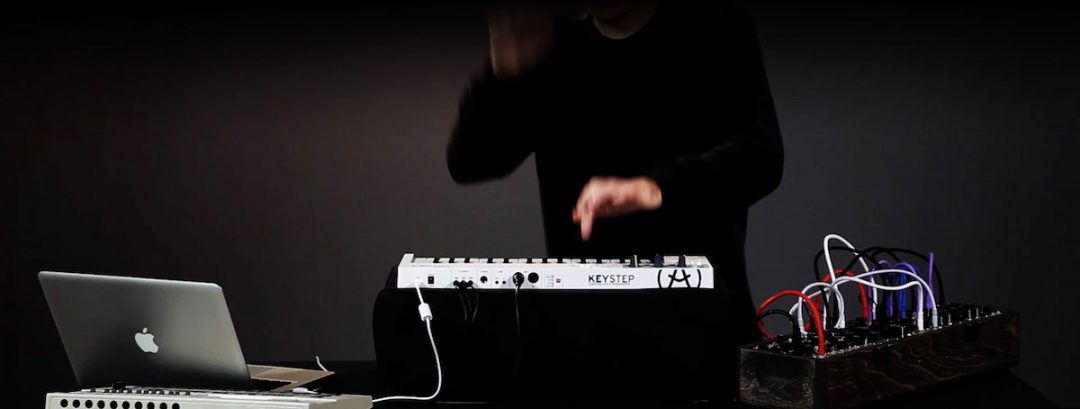The Arturia KeyStep is a riff on the portable MIDI controller, combining classic keyboard functionality with polyphonic step sequencing. It can control both digital and analogue gear thanks to a variety of I/O, and the 32-key layout offers a bit more range than the competition.
Arturia KeyStep Overview
The KeyStep premise started with the keyboard itself. Arturia came up with their own ‘slim key’ design and action; it balances the best features of compact mini controllers (size/portability) with the musicality of full-sized keys. The size, velocity, and aftertouch of the Slimkey all lend themselves to playability not found in other portable controllers.
Arturia also threw in a polyphonic step-sequencer with 8 programmable memories, recallable by turning a knob. From there, users can choose gate times and swing settings to quickly change the feel of the sequence. With that there’s also the ability to record, overdub, and transpose sequences in real time and still play the keyboard live. Finally, they’ve added a flexible arpeggiator and chord play mode for fast and fun music-making.
Connectivity
While the features above are competitive enough to be a contender in the mini MIDI controller market, Arturia added a range of connectivity options for professional, performance usage.
Included I/O:
- USB MIDI
- MIDI in and out
- Clock sync and DIN sync jacks
- CV/GATE outputs, plus a separate, assignable modulation CV output that can be used with the mod wheel, velocity, or aftertouch
These connections mean Arturia KeyStep can control any piece of digital or analogue gear. In reality, it’s more than just a backpack controller. It’s supposed to merge into whatever setup you have for additional flexibility and control over your workflow.
Arturia KeyStep Features
- Arturia’s own Slimkey keybed with velocity and aftertouch
- Arpeggiator mode:
- Up, down, inclusive, exclusive, 3 random modes, note order, double up, double down modes
- Sequencer mode:
- 8 polyphonic step-sequences with Rest, Tie, and Legato note entry
- Rate control and tap tempo:
- REC, PLAY, and STOP buttons for performance control over the sequencer and arpeggiator
- Octave controls for keyboard and arpeggiator
- Sustain HOLD button
- Sustain pedal jack
- Chord play mode
- SHIFT button selection:
- MIDI channel selection, GATE time, SWING values
- DC jack for standalone operation
- USB MIDI connects to computers and Arturia’s MCC editor
- MIDI I/O ports
- Sync I/O ports:
- Supports 1 pulse per step, 2 PPQ (Korg Volca), 24 PPQ DIN sync, 48 PPQ DIN sync
- Sync select switches:
- Internal, USB, MIDI, Clock
- CV/GATE outputs:
- CV supports 1Volt per octave, Volt>Hz modes, Gate output 5V or 12V for modern or vintage gear support
- CV Velo/Aftertouch/Modwheel output
- Capacitive-touch pitch bend and mod wheels
- Each sequence can have 64 steps, each step can have up to 8 notes
- Low bus power requirements; can be powered by Apple iPad (camera connection kit required)
Compromises
The Arturia KeyStep is a great controller. The Slimkey design is unique and intuitive, and the connectivity is unmatched if you intend to control any analogue synths like modular units. KeyStep’s build quality is on-par for its price as well.
Some gripes that users note is firstly the inclusion of mod and pitch ribbons instead of the traditional wheels. It’s Arturia’s way of quite literally ‘reinventing the wheel,’ perhaps aiming to reduce the height of the keyboard. They take some getting used to, however, and left anywhere above 0, there’s no physical indication of them.
Another potential complaint is actually the size of the KeyStep itself. Adding another octave of keys means the unit is longer than a 25-key controller like an Akai MPK Mini. If you plan to throw it in a backpack to take on the go, you might find that it sticks out the top.
- RELATED: Akai Professional MPC One Review
- RELATED: Akai Professional MPK249 Review: The Best Mid-Range MIDI Keyboard?
- RELATED: The 6 Best DJ Controller Stations for Any Budget
Ultimately, these are minor inconveniences at most. The Arturia KeyStep’s existence in the portable MIDI controller world is completely justified.
